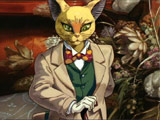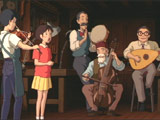

Quick Links:
Whisper of the Heart (Mimi wo Sumaseba)
The name "Studio Ghibli" is largely considered synonymous with founder/director Hayao Miyazaki. I've learned since that it's a mistake to limit one's Ghibli experiences to Miyazaki alone, thanks to the highly praised Grave of the Fireflies and a lesser-known film by the title of Whisper of the Heart. For the latter, the late animator Yoshifumi Kondou took the helm as director and made a film that will steal your heart and leave you breathless with its beauty. At the time of Kondou's passing in 1998, Miyazaki said Kondou's work showed a "sense of freedom," and Whisper of the Heart as Kondou's opus represents the statement perfectly. It is a work that captures the magic of animation and the romantic view of life that has captivated movie audiences since the beginning of the trade.
Whisper of the Heart is about a young girl discovering herself in her third year of junior high-school. Her name is Shizuku Tsukishima, a total bookworm (which isn't altogether surprising, as her father is a librarian). She is specifically a fiction nut, and even seeks a mystery prince - a boy named Seiji Amasawa, whose name appears on the card in almost every book she checks out. The world changes for Shizuku one day, when a strange-looking cat accompanies her on the local train as she delivers her father's lunch to him. She chases after the feline - who seems indifferent to her interest - after the train stops, and remarks that it is like something out of a storybook. The rest of the movie feels as if it is; as if some supernatural force is enabling Shizuku to face her fears.
Mimi wo Sumaseba has the literal meaning: "If You Listen Closely...." At the grass-roots level, this is what the film is about: paying attention to what your heart tells you. Watching it is like being a child in a candy store. Through its overall ambience and scenery that seesaws between fantasy and reality, Whisper encourages the imagination to run wild. The result is a joyful and fun experience, feeding the creative mind with its potent elixir.
Shizuku's imagination and creativity are her keys to happiness in the film. Like any good coming-of-age story, there are trials she must go through before she finds what she's looking for. At the start of the film, she doesn't know what she wants to do with her life. But as with many questions, the answer is right under her nose, and she just needs a little push. Not only does the film have that "sense of freedom," but freedom is a big theme of the film. Shizuku is not really tied down by anything in her life, but still cannot see her purpose until she opens herself up to all the possibilities. I believe at some level the film was making a statement about how many people are imprisoned by their own thoughts and fears. To challenge your own being can be frightening, but the rewards for doing so are boundless.
Part of what makes that challenge bearable is inspiration. There are many sources of inspiration that feed Shizuku's desire to find her purpose. One is a skillfully crafted figurine of a sort of personified cat, wearing a suit and top hat, and holding a cane. He resides in a small shop that Shizuku finds while chasing the strange cat, and the owner says his name is Baron Humbert Von Jikkingen. He also shows her a fairy tale themed clock he has been fixing. (An item of interest here is that the clock's face has the words "Porco Rosso," the name of a Miyazaki-directed Ghibli film.) She takes an interest in the old shop owner and decides to visit again. Another source that feeds her imagination is the mystery prince, Seiji Amasawa. She soon learns that things aren't always as she imagines them, though. It is no coincidence that the things Shizuku takes a great interest in are beautifully drawn. The Baron especially takes the spotlight, not only being an amazing piece of work but also having a great history. Director Kondou knew all too well that perspective is what gives a work life. Shizuku as well as the other characters in the story are believably reality-based, and also believably based in fantasy. It is this duality that allows the movie to focus on certain ideas that cannot be seen or heard, only felt. The fact that there is never a moment where the visuals make it unclear as to what sentiments the film is expressing is really an amazing thing.
The joy of music is also a big theme in the film, and the visuals nurture it well. Below the shop Shizuku likes to visit is a workshop for aspiring violin makers, of which a certain boy she met is a pupil. One of my favorite scenes in the film is where he agrees to play a song for her if she sings along. The main theme song of the movie is a remake of John Denver's 1971 song, "Take Me Home, Country Roads," (off his Poems, Prayers and Promises album) translated to Japanese. In the film, Shizuku is the one who does that translation, and this has significance to the rest of her story. "Country Roads" is a simple yet uplifting tune, and the rest of the movie's music is very similar. The fact that it just "fits" - instead of standing out in all its glory - is what makes it perfect for this film. I can see the movie being negatively impacted if the opposite were true, because part of its appeal is how well its elements work together.
If you listen closely, the whispers of the heart will lead you along the right path. Mimi wo Sumaseba is the kind of film that makes me thankful to be alive; but more importantly, it makes me want to share the sentiment with others (this is your cue to obtain a copy of the film for yourself). It is a wondrous film that so easily captures feelings that people spend lifetimes trying to hold on to, some succeeding and some failing. Yoshifumi Kondou's legacy will forever serve as a reminder to people that they should always follow their heart's desires, and that it's never too late to start.
The resources of Nausicaa.Net were consulted in the writing of this review. See their "Whisper of the Heart" page for more information on Yoshifumi Kondou's life, work, and death.
Distributor: Disney (Region 2 DVD) Creator: Yoshifumi Kondou / Studio Ghibli Released: 1995
Plot: A+ Character Design: A Animation Quality: A+ Music: A Overall: A+



